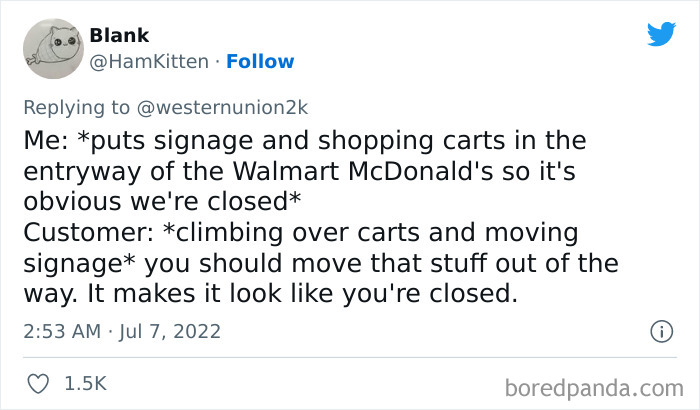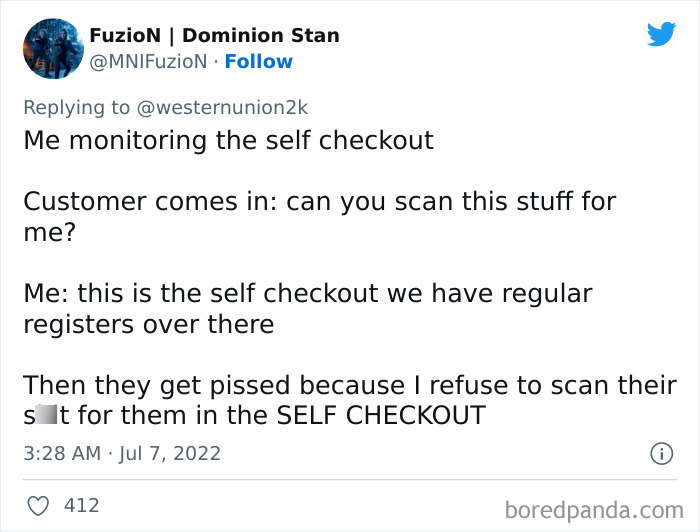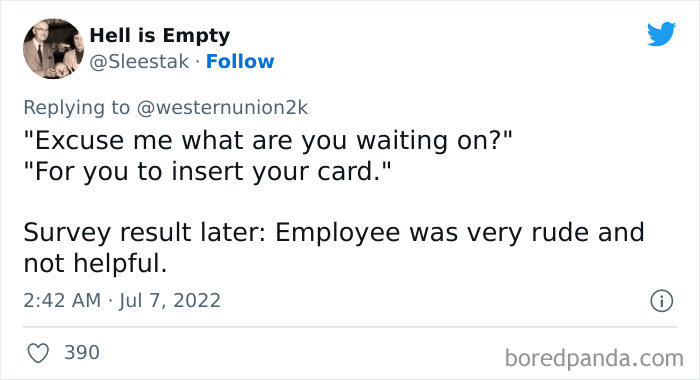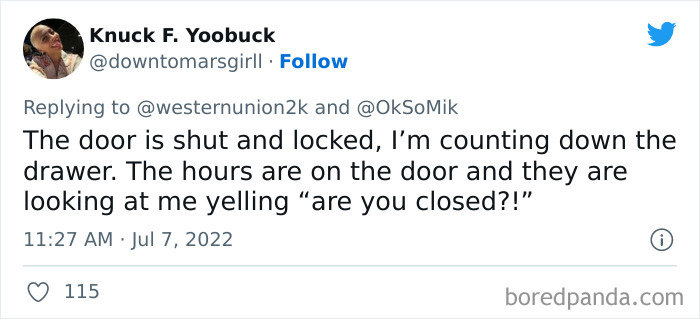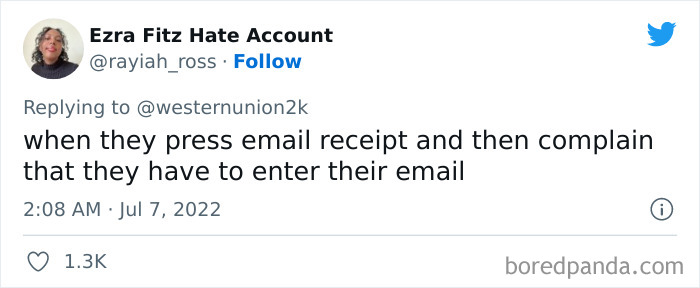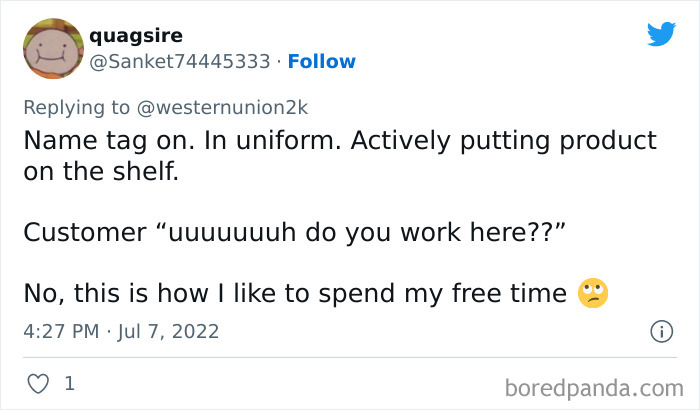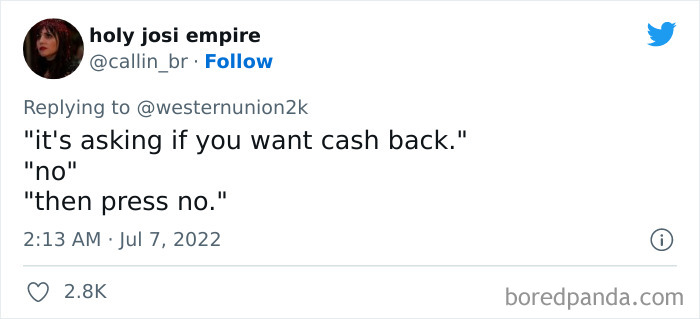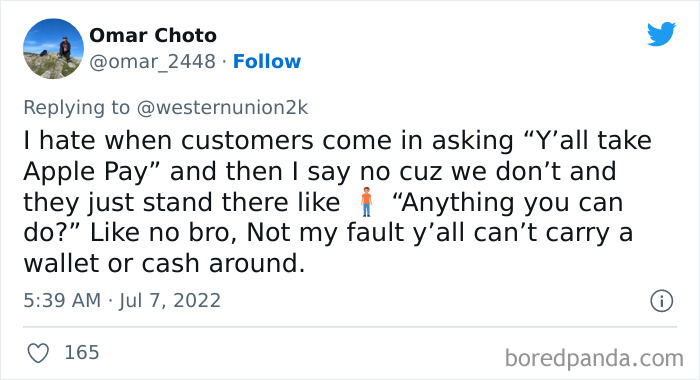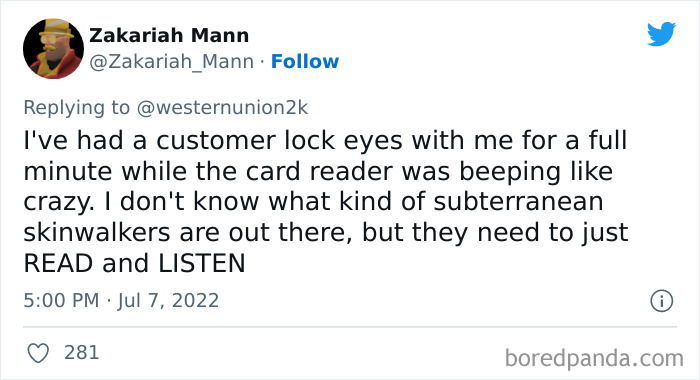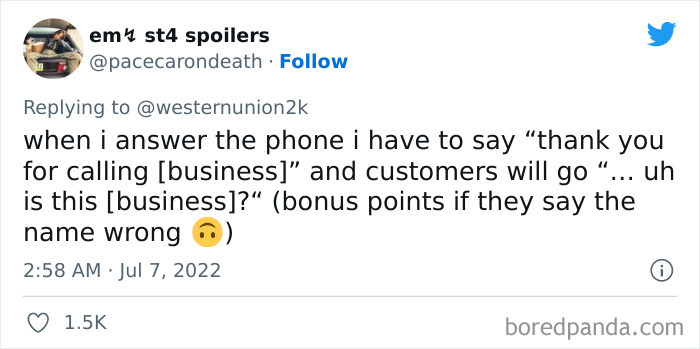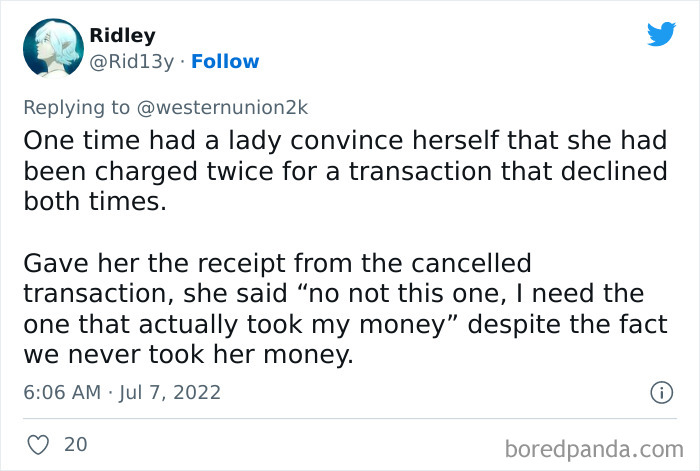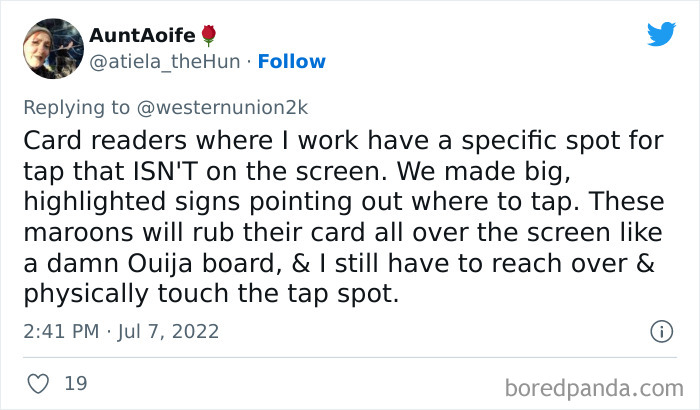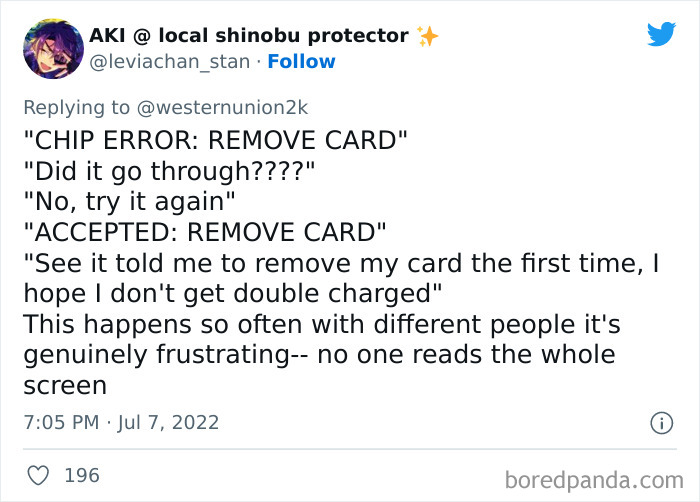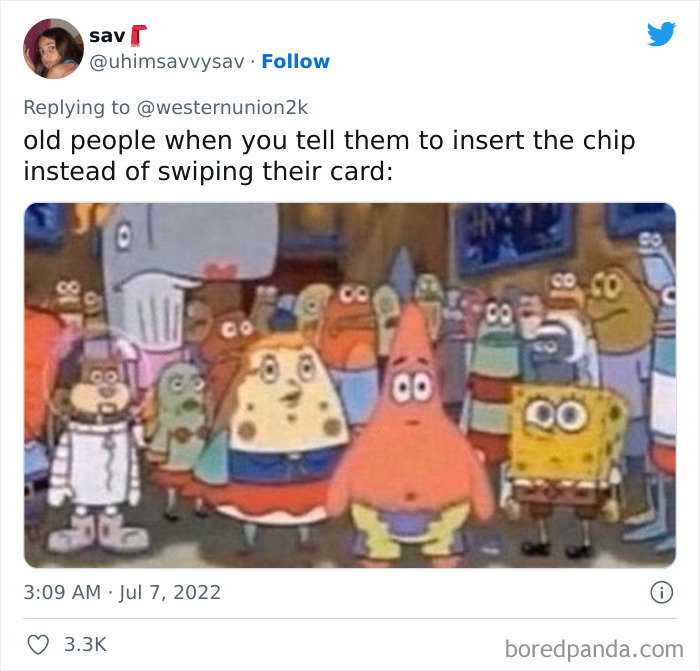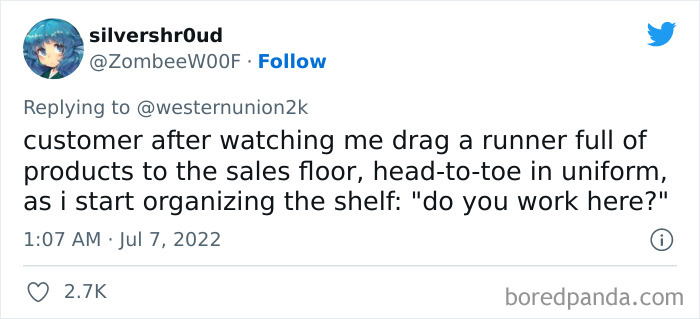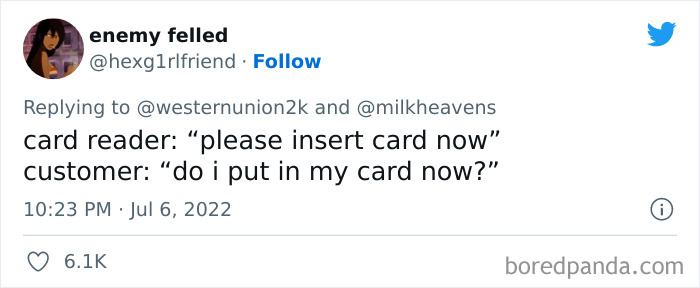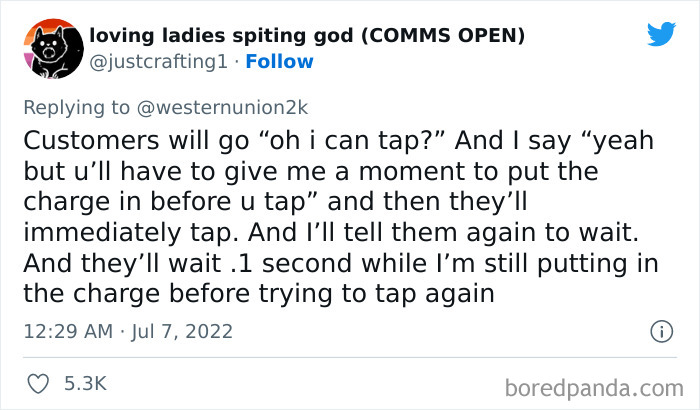
30 Savage Burns By Employees Who Are Tired Of Clueless, Dumb And Frustrating Things Customers Say
The customer is always right. Whether they forgot to ask for their pizza with no tomatoes until it arrived at their table or they swear they had a coupon for soup in their basket but now it’s nowhere to be found. One of the unfortunate aspects of working in any customer service job is dealing with customers who seem to have left their common sense at home. From asking stupid questions to making illogical demands, every retail or service industry employee has a treasure trove of stories about customers who should have taken a moment to think before they spoke.
Last week, Westernunion2k tweeted, “Customers will say [stuff] like ‘Uhh it's asking me to remove my card?’” and sparked a conversation where many other employees shared moments from their jobs where customers made them want to facepalm. Below, you can read some of the conversation, and then let us know in the comments what the stupidest thing you’ve ever heard a customer or client say was. Then if you’re interested in reading another similar Bored Panda piece, we’ve got the perfect story mocking even more customers right here. Image credits: westernunion2k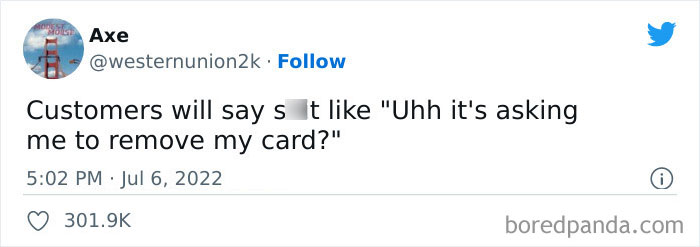
This post may include affiliate links.
Obviously, the customer is not always right, but for some reason, particularly in the United States, that is the understanding that all customers and employees have in the service industry. Workers are expected to bend over backwards for their patrons, while the customers expect to be treated like royalty. While it’s not completely clear where this old motto originated, various American retail pioneers like Marshall Field, Harry Gordon Selfridge and John Wanamaker have all been credited for popularizing the idea. Although, it was not a purely American mindset, as the Swiss hotelier Cesar Ritz, founder of Ritz Carlton hotels, had a similar slogan in the 1890s of “Le client n'a jamais tort”, or “the customer is never wrong”.
'Working in retail taught me how many adults can't read', there, amended it for you......
Other countries have their own versions of this saying as well, as Blake Morgan pointed out in her Forbes piece “A Global View Of 'The Customer Is Always Right'”. In Spanish, the phrase is “el cliente siempre tiene la razón”, while “il cliente ha sempre ragione” is the Italian equivalent. These both translate to “the customer always has a reason”, so employees are tasked with understanding the customer’s reasoning and accommodating them accordingly. The German phrase takes it one step further by saying “der Kunde ist König” or the customer is king. In Japan, customers are even referred to as gods. These ideas run deep in many societies, as Blake pointed out that even in 1905, a publication from Sears, Robuck and Co. in the United States said, “Every one of their thousands of employees are instructed to satisfy the customer regardless of whether the customer is right or wrong.”
Customers are not immune to saying stupid things, in fact they might be prone to doing it, but employees are often told to treat them like they are. One reason for this is to ensure customer satisfaction and loyalty. I once worked a customer service job where the highest priority was to just make sure a customer never left upset. Offer them a gift card or free service, apologize profusely, but just don’t let them leave thinking they will never come back. This is not always the best tactic, however, because as Kathy Dalpes at Zendesk points out, “Your employees are your customers as well.”
Yeah because it’s supposed to automatically know it. What kind of Walmart are you? /s
My Father-in-law, bless him, went to the local burger bar, he was in his late eighties. They called out his order but he was a bit hard of hearing. After a few calls, one of the staff shouted "it's for the old boy at the back". To which FIL turned and said why don't these old duffers ever listen. Much laughter ensued, and he was, for some reason, very happy to tell everyone about it for days.
“Some critics of the idea that ‘the customer is always right’ contend that it amounts to putting customers above employees or the business itself, but there doesn’t have to be a tradeoff here,” Kathy explains. “If you treat your employees as well as your customers, and empower them with the technology, processes and creative enablement to deliver truly frictionless experiences, your customers will become advocates for your business.”
It is a delicate balance for business owners to satisfy their patrons without alienating their employees. But Kathy explains that in this modern day, accommodating customers is more about providing a frictionless experience than about believing every silly little thing a customer says.
To provide the smoothest experience possible for customers, Kathy notes that businesses must make themselves available. Whether that means running active social media accounts, having specialists available to chat with customers on the website, or having phone lines open 24/7, being responsive means a lot to customers. Zendesk reports that they’ve seen a massive rise in “customer support tickets on social messaging channels” since the beginning of the pandemic, with over a 100% increase just on WhatsApp. Knowing that they can have their problems solved quickly and without any difficulties makes customers feel taken care of, and it encourages them to trust the company. They will be more likely to return in the future, and they’ll even spread the message to friends and family.
Understanding who your customer base is can also be important. Customer loyalty is a huge focus for many companies today, and with the technology we have at our fingertips, there is no reason for a business to not understand customer trends. According to the Zendesk Customer Experience Trends Report, “71% of customers expect companies to collaborate and share data internally, so they don’t have to repeat themselves.” A customer may not always remember the name of the stylist who cut their hair 3 months ago, but they trust that the receptionist will be able to look it up for them. And you might not remember the last time you bought a pair of jeans, but your favorite retail store can probably tell you once you provide them with your phone number. The more information you have for a customer, the less likely they are to ask stupid questions, and the more likely they are to feel comfortable in your business.
Going to be honest, before I could double check on my phone, I use to get really paranoid too.
yep I do this all the time and I have a genius IQ. You need to just use cardreaders that accept the screen tap because we are all habituated to that now. if you have to tap the head of the device it's confusing. I'm one of those people who pushes doors with a clear sign that says "pull".
The customer does not always have to be treated like they are right, but it does not hurt to make them feel welcomed. Being conversational can also go a long way in making customers feel comfortable, and if an employee provides clear explanations and descriptions of products, the customer might not need to ask as many questions. Making a large purchase like a car or a new appliance can be nerve-racking, which might be part of the reason nervous customers say dumb things, but when an employee makes an effort to engage them in conversation, their fears may dissipate. “With the right tools, your employees— remember they’re customers too! — should be able to deliver true conversational experiences across all your customer touchpoints,” says Kathy Dalpes. “When both sides know each other the experience becomes more engaging, more natural, and ultimately, more successful.”
I have been double charged in that exact scenario, though. Technology is FAR from perfect, and 20 years of working in customer service taught me that point of sale systems are the furthest from perfect that you can get without just using a stick and a rock to ring up your order
Now, aside from the dumb questions about when to remove their cards from the chip readers or how much something costs when the price is clearly on the product, there are certainly times where a customer is not only ignorant, but blatantly wrong. If they ask for water at a restaurant for the “second time” when you know it’s the first time, sure, they can be right. But if they are outright rude or bigoted, those customers are not worth keeping in the first place. According to the Pareto Principle, or the 80/20 rule, 20% of customers usually account for 80% of total profits. When you encounter a nightmare customer who is making employees, or other customers, uncomfortable, chances are, your business can afford to lose them. If catering to them is more effort than it’s worth, just hold the door open for them and hope they never come back.
If she's old, there's a very good chance that she has memory issues. Most of these are funny, this one is just cruel.
As we all know, it is impossible to please everyone. In one of my previous customer service jobs, within the same day, I would hear excited compliments and heated complaints about the music that was playing in the salon. Everyone has their own preferences, and that is okay. As Kumar Arora wrote in Forbes, “Using ‘the customer is always right’ in your daily business practices works under the assumption that you can satisfy every customer 24/7. This is a fool’s errand. Even the largest and most successful brands know this to be impossible, and so should you. People are unique. We all have different tastes in fashion, food, cars, homes, etc., and if you attempt to satisfy every customer's needs, your business will quickly fail.”
I wonder if this is a sign that sooooo many devices are misdesigned as they obviously do not meet how many people function.
"Insert the chip? I'm sorry, I ate all my fries. I didn't realize I needed to keep one for verification."
As much fun as it is to mock dumb things customers have said, it is also a reminder to not be that customer. Employees and patrons are just trying to get through the day, whether they are running an errand or working a job they are less than passionate about to provide for their family, so they both appreciate it when the other makes their life easier. Workers, try to have patience with customers who might be a little bit slow to understand things like card readers, and customers, just take a moment to think before you speak. Or you might end up being roasted on Twitter.
Early’s 2000’s there used to be an option for that - you could swipe your card and enter your pin while the cashier was scanning then you just had to “approve” at the end. Doesn’t exist anymore, and I’m sure I can guess why, but I liked it for those quick trips with a small basket of stuff.
It should read my mind before you even punch it in or swipe the card. I should just think of it and it happens - Customer
I work in a store, but usually shop in another. Often out of uniform, but, once, after I had finished work I nipped over to the other store quickly while still in my uniform. Neither uniforms look similar and both are branded with the names of the stores. While buying my shopping and putting it in the cart another customer came over, stared fixedly at me then asked me if I worked there and did I know what aisle the toiletries were in. I just stared back, dumbfounded!
People can get flummoxed by things like this - often poor education or dyslexia plus social anxiety. try to be kind and patient.
These are the same people who can’t wait for you to unlock the car door so they can open it
Customer: I just need a minute of your time (Five minutes later; customer is still asking questions and one of your coworkers walks by and says) Coworker: Hey, I thought you were headed to lunch!
If the customer looks like this, i´ll say yes to any b******t that drop out from their mouth.
I know all of the above is extremely frustrating but I am one of those annoying people... I suffer with terrible anxiety and I start to panic sometimes the moment I put my shoes on to leave the house then when I get home after shopping I want to close my curtains, cry and never leave the house again after I go over and over in my mind how dumb and annoying I must've been. (typing this is anxiety inducing let alone hitting the post button!) I do apologise! X
I have severe anxiety as well, and spent 20 years working in customer service, so I feel your pain. Most service workers won't remember you the second you walk out the door. Honestly, people just aren't paying that much attention to you, because they're paying too much attention to themselves. I'm saying this to be helpful!
Load More Replies...I don't think a lot of store employees realize how over-stimulating and confusing their shopping environment can be for someone with social anxiety, ADHD, or mild cognitive decline. And they get annoyed if you try to put in your card too fast, but also if you don't do it fast enough. And every store has a slightly different kind of card reader. Restaurants, too, can sometimes be very loud and distracting, plus you're trying to have a conversation with your dinner companions, so you might need extra cognitive processing time when you're asked a question. Can we try to be a little more patient and less ableist with each other?
As long as these little rants are just happening outside of work, I get it. It can be annoying for the employees to have the same conversation with people over and over. As soon as they let it affect how they're treating the customer, though, they're the assholes. Because you're right, there are a lot of potential reasons people may not be able to follow the "simple" instructions, and if the customer isn't being a jerk about it, there's no need to be a jerk back to them.
Load More Replies...It seems like 70% of these dealt with card readers, so maybe it’s that card readers really are annoyingly confusing and inconsistent, and it’s not us (customers). As customers we expect you (the employee) to be more familiar with how it works, and that means that, rather than learn how each new one works, we might ask you to walk us through its operation, which is the LEAST you can do.
100% this. Why are they all so different and difficult!
Load More Replies...I know all of the above is extremely frustrating but I am one of those annoying people... I suffer with terrible anxiety and I start to panic sometimes the moment I put my shoes on to leave the house then when I get home after shopping I want to close my curtains, cry and never leave the house again after I go over and over in my mind how dumb and annoying I must've been. (typing this is anxiety inducing let alone hitting the post button!) I do apologise! X
I have severe anxiety as well, and spent 20 years working in customer service, so I feel your pain. Most service workers won't remember you the second you walk out the door. Honestly, people just aren't paying that much attention to you, because they're paying too much attention to themselves. I'm saying this to be helpful!
Load More Replies...I don't think a lot of store employees realize how over-stimulating and confusing their shopping environment can be for someone with social anxiety, ADHD, or mild cognitive decline. And they get annoyed if you try to put in your card too fast, but also if you don't do it fast enough. And every store has a slightly different kind of card reader. Restaurants, too, can sometimes be very loud and distracting, plus you're trying to have a conversation with your dinner companions, so you might need extra cognitive processing time when you're asked a question. Can we try to be a little more patient and less ableist with each other?
As long as these little rants are just happening outside of work, I get it. It can be annoying for the employees to have the same conversation with people over and over. As soon as they let it affect how they're treating the customer, though, they're the assholes. Because you're right, there are a lot of potential reasons people may not be able to follow the "simple" instructions, and if the customer isn't being a jerk about it, there's no need to be a jerk back to them.
Load More Replies...It seems like 70% of these dealt with card readers, so maybe it’s that card readers really are annoyingly confusing and inconsistent, and it’s not us (customers). As customers we expect you (the employee) to be more familiar with how it works, and that means that, rather than learn how each new one works, we might ask you to walk us through its operation, which is the LEAST you can do.
100% this. Why are they all so different and difficult!
Load More Replies...
 Dark Mode
Dark Mode 

 No fees, cancel anytime
No fees, cancel anytime 






